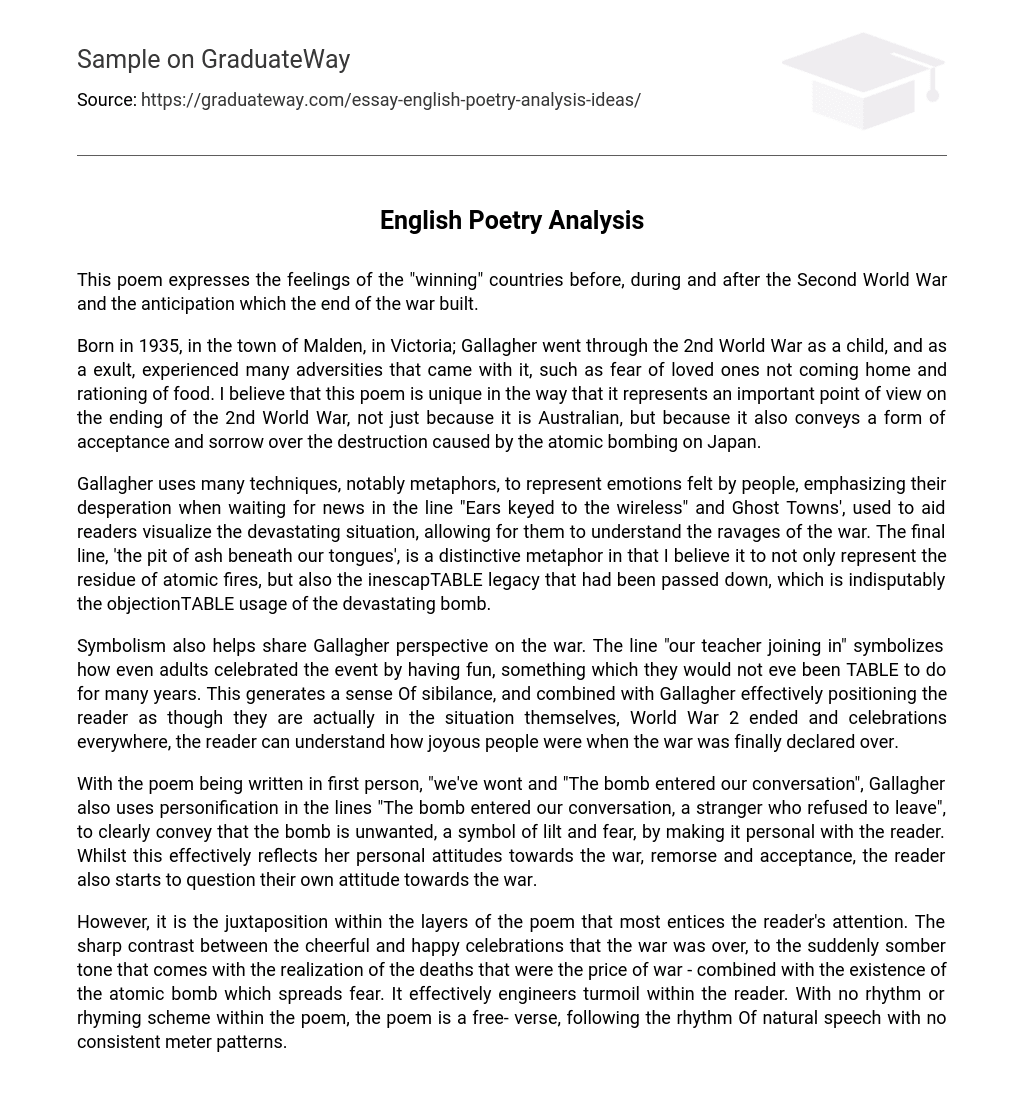This poem expresses the feelings of the “winning” countries before, during and after the Second World War and the anticipation which the end of the war built.
Born in 1935, in the town of Malden, in Victoria; Gallagher went through the 2nd World War as a child, and as a exult, experienced many adversities that came with it, such as fear of loved ones not coming home and rationing of food. I believe that this poem is unique in the way that it represents an important point of view on the ending of the 2nd World War, not just because it is Australian, but because it also conveys a form of acceptance and sorrow over the destruction caused by the atomic bombing on Japan.
Gallagher uses many techniques, notably metaphors, to represent emotions felt by people, emphasizing their desperation when waiting for news in the line “Ears keyed to the wireless” and Ghost Towns’, used to aid readers visualize the devastating situation, allowing for them to understand the ravages of the war. The final line, ‘the pit of ash beneath our tongues’, is a distinctive metaphor in that I believe it to not only represent the residue of atomic fires, but also the inescapTABLE legacy that had been passed down, which is indisputably the objectionTABLE usage of the devastating bomb.
Symbolism also helps share Gallagher perspective on the war. The line “our teacher joining in” symbolizes how even adults celebrated the event by having fun, something which they would not eve been TABLE to do for many years. This generates a sense Of sibilance, and combined with Gallagher effectively positioning the reader as though they are actually in the situation themselves, World War 2 ended and celebrations everywhere, the reader can understand how joyous people were when the war was finally declared over.
With the poem being written in first person, “we’ve wont and “The bomb entered our conversation”, Gallagher also uses personification in the lines “The bomb entered our conversation, a stranger who refused to leave”, to clearly convey that the bomb is unwanted, a symbol of lilt and fear, by making it personal with the reader. Whilst this effectively reflects her personal attitudes towards the war, remorse and acceptance, the reader also starts to question their own attitude towards the war.
However, it is the juxtaposition within the layers of the poem that most entices the reader’s attention. The sharp contrast between the cheerful and happy celebrations that the war was over, to the suddenly somber tone that comes with the realization of the deaths that were the price of war – combined with the existence of the atomic bomb which spreads fear. It effectively engineers turmoil within the reader. With no rhythm or rhyming scheme within the poem, the poem is a free- verse, following the rhythm Of natural speech with no consistent meter patterns.
Thus, Gallagher uses precise language and strong phrasing in order to get her point across quickly and concisely, such as the lines ‘Japan bombed, gigantic clouds curling, skies burnt scarlet -total destruction .. .I’ and “The War over. ” This short, sharp rhythm is very effective as it doesn’t let the reader’s mind wander from the point, thereby successfully demanding the reader’s attention at all times. Outstay Sahara English Poetry’ Year 11 Term 2 Semester 1 2014 Poem Annotation The Last War There was only one war, and it was finishing any day soon.
Ears keyed to the wireless, we waited. Then the news: Japan bombed, gigantic clouds curling, skies burnt scarlet – total destruction We’ve won, we’ve won, a conga- chant round the schoolgirl’s, beating tins, sticks: our teacher joining in – flags, jumbled cries – uncles and cousins coming back. The war over. Hiroshima, Nagasaki – ghost towns now. Over two hundred thousand people ghosts too. We couldn’t imagine it. The bomb entered our conversation, a trainer who refused to leave. Only years on did we become aware of the pit of ash beneath our tongues.
Katherine Gallagher Taken From https://www. Patriotically. Du. AU/poets/Gallagher-Katherine/the- last-war-0646045 Comment [u 1]: Symbolic – represents the anticipation that everyone had waiting to hear the news that the war had ended – therefore the suffering and death as well had ended. Comment [u]: Symbolic – represents that this Comment [u]: Short, sharp rhythm – gets straight to the point instead Of wandering, doesn’t let reader’s mind wander from the point. Comment [u]: Symbolic – represents that there was nearly nothing left after the explosion, everything had been decimated.
Comment [u]: Symbolic – represents the sibilance felt by those who were relieved that the war had ended, generating a sense of relief Comment [u]: Symbolic – represents how even the adults celebrated the event by having a little fun – something they had not been TABLE to do for many years. Comment [u]: Symbolic- represents how separated families got back together after the war Comment [u]: Symbolic – represents how the cities were literally empty no, tit nothing at all left untouched.
Comment [u]: Symbolic – represents that how many people were lost Comment [u 10]: Symbolic – represents how, in the countries that “won after the war, as the people there could not feel the direct effects of how the war was ended (atomic bomb), and no-one could imagine it, people celebrated, instead of mourned.





